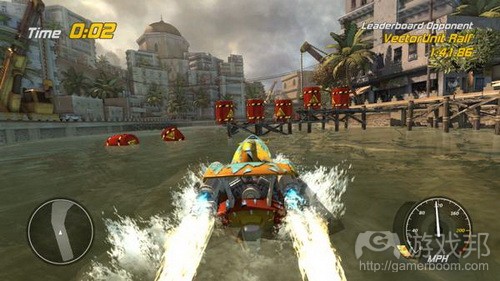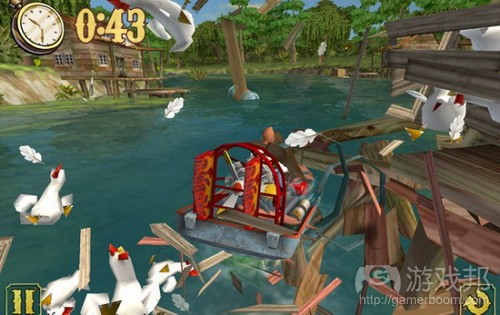供意图转战手机平台的掌机开发者参考的10点建议
作者:Kris Graft
独立开发工作室Vector Unit创意总监Matt Small表示,当工作室首次推出Xbox Live Arcade游戏《飓风迅雷赛艇》时,他们以为自己会一直投身于掌机游戏领域。
然而随后智能手机和平板电脑市场逐步兴起,手机设备开始提供越来越强大的处理能力。手机处理能力的提高给Vector Unit的开发人员带来新的机会(游戏邦注:Vector Unit此前已投身掌机游戏很多年)。
所以工作室开始和图睿芯片制造商Nvidia合作,制作出Android和iOS游戏《Riptide GT》,这款激流快艇竞赛游戏,整个制作过程耗时5个月。这之后公司又推出另一多平台水上竞速游戏《Shine Runner》,这款游戏耗时4个月。
在GDC 2012上,Small向意图转战手机平台的掌机游戏开发者提出10点建议。
1. 接受手机领域的残酷现实
Small提醒开发者,手机领域的多数销售成绩都来自少数开发者——这是片相当拥挤且竞争激烈的市场。Small表示,“要获得第一的位置很难,除非你能够创作出像《愤怒的小鸟》这样的作品。”
2. 重新思考角色
尤其是在小型工作室,开发人员要能够身兼数职。Small表示,“在组建团队时,尤其是作为初创公司,你需要寻找高灵活性的人才。”
3. 高效制作
Vector Unit的开发过程一直基于效率原则。这点体现在《Riptide GT》和《Shine Runners》的较短开发周期上(游戏邦注:两款游戏分别耗费5个月和4个月)。
4. 判定目标用户
Small还表示,找准自己的目标用户非常重要。“硬核”玩家和“休闲”玩家都会利用自己的手机设备体验游戏,所以手机游戏开发者享有很多机会。
他表示,“这些用户完全融为一体。手机平台存在众多的掌机用户,同时也有很多的休闲玩家。”
“我觉得任何手机游戏类型都有自己的目标用户。开发者应瞄准用户制作游戏 ,不要遍地撒网,企图囊括所有用户。”
5. 着眼于功能组合
Vector unit从一开始就留心找准所开发游戏的核心功能。所有内容都要同功能组合挂钩。Small表示,例如在《迅雷赛艇》中,“我们想要呈现即时的紧凑玩法”,这始终是整个开发过程的核心焦点。
6. 保持组织性
Small表示,“我觉得任务追踪和保持组织性非常重要。”我们投入额外时间制作电子表格追踪工作任务和开发进度,当工作室记录下所有游戏制作细节后,它就有任务执行时间和所需投入精力的参照点(例如,添加新赛道)。这是掌机游戏开发者原本就熟悉的东西。
7. 不要过度吝惜自己的游戏构思
Small表示,“不要过度吝惜你的游戏构思。”开发者无需在保持高度机密的情况下制作游戏。Small团队倾向与世隔绝。开发者最好还是在工作室之外寻找输入内容。
Small表示“向好友和家人展示游戏内容非常重要,不妨随机在街上邀请玩家试验你的游戏,给出相应的反馈信息。”
8. 发行测试版本?
掌机游戏开发者通常不习惯推出不是100%“完工”的作品。手机平台允许开发者持续在游戏中添加新功能。但这并不意味着开发者可以发行有所残缺的作品。他表示,“发行能够顺利运作的内容非常重要,也就是具有最低可行性的作品。然后确保自己今后会做出相应回应。”
9. 控制装置、风格和UI
Small表示,控制装置、风格和UI是手机游戏开发者应注重的3大要素。Small补充表示,关于独特风格,“作为小型开发者,你很难匹敌Chair(游戏邦注:《无尽之剑》的开发者)。但要找到吸引用户眼球,充分发挥团队优点的艺术风格。”
10. 走跨平台路线
制作跨平台游戏需要投入很大精力,但Vector Unit从中受益良多。“以我们的作品《Riptide》来说,单iPhone版本的销量就足够抵消我们的开发成本。”但Android版本让Vector Unit真正获得丰厚收益。
他表示,“我们的Android销量远超越iPhone版本。”他补充表示,游戏在很长一段时间内都维持相同销售成绩。他表示,“这是Android销售成绩的一大推动因素。”
虽然Small非常推崇跨平台手机游戏开发,但他补充表示,“你所得到的收获也会随此而发生变化。”
平价和简单路线
意图转投手机平台的掌机游戏开发享有众多机会。Small表示,“这个趋势处于持续变化中。你将在手机平台看到越来越多高端3D游戏。未来你可以在这个平台呈现丰富数据。如今这些在手机平台越来越具可行性。掌机开发者享有众多发展机会。”
他补充表示,“保持低价位,保持简单性。学会管理自己的成本,这样你就能够通过随后的收益实现收支平衡。”(本文为游戏邦/gamerboom.com编译,拒绝任何不保留版权的转载,如需转载请联系:游戏邦)
GDC 2012: How Vector Unit made the leap from console to mobile games
by Kris Graft
Matt Small, creative director at independent developer Vector Unit, thought his small studio would focus on consoles forever when it was working on Hydro Thunder Hurricane for Xbox Live Arcade.
But then the smartphone and tablet market picked up, and mobile devices started to offer increasing amounts of processing power. That increase in power opened up new opportunities for the people at Vector Unit, which had years of developing for consoles.
So the studio worked with Tegra chipmaker Nvidia and created the Android and iOS game Riptide GT, a jet ski racing game that took five months to develop. After that came another multiplatform water racing game, Shine Runner, which took about four months to develop.
At GDC 2012, Small laid out 10 tips for console game developers who are considering making the leap to mobile.
1. “Embrace the brutal truth of the mobile market.”
Small warned that the vast majority of sales in the mobile game market come from a small percentage of developers — it’s an extremely crowded and competitive market. “The top 1 percent is very hard to get into unless you’re Angry Birds,” said Small.
2. “Rethink roles”
At small studios in particular, people need to be able to do more than one thing well. “When you’re building a team especially when you’re hiring a startup, you need people who are flexible,” said Small.
3. “Build Efficiently”
Vector Unit’s development process was built around efficiency. That’s reflected in the short development cycles of Riptide GT and Shine Runners, which took five months and four months to develop, respectively.
4. “Identify your audience”
Small also said it’s important to know who you’re making your games for. “Hardcore” players and “casual” players use their mobile devices for games, so there are lots of opportunities for mobile game makers.
“These audiences are totally merging. There’s ton of hardcore gamers on mobiles, and there and also lots of casual players,” he said.
“I think there’s an audience for just about any kind of game you want to make on mobile. …Use the [audience] as a benchmark…don’t try to be all things to all people.”
5. “Be ruthless with your feature set”
Vector unit was careful from the beginning to identify the core features of the game in development. Everything must relate back to this feature set. In Hydro Thunder, for example, “We wanted a really tight moment to moment gameplay,” said Small, and that remained a focus throughout development.
6. “Get ‘organizized’”
“I think actual task-tracking and organization, that is really important,” said Small. It takes extra effort to track tasks and development in spreadsheets, but when a studio records all of the details of making a game, it then has a concrete point of reference for the time and effort it takes to perform specific tasks (e.g. adding a new race track). This practice is also something that developers with console game backgrounds may already have experience with.
7. “Don’t be precious”
“Don’t be precious with your ideas,” said Small. Developer don’t need to make a game top secret during its development. Small teams have the tendency to become very insular. It’s best to look for input outside the walls of the studio.
“It’s really important to get it in front of friends and family, you want to pull people off the street [to try your game and give feedback],” said Small.
8. “Ship your Beta?”
Console game developers may not be used to shipping a game that isn’t 100 percent “done.” Mobile platforms offer developers opportunities to constantly update games with new features. But that doesn’t mean developers should ship broken games. “It’s really important to ship something that actually works… something that is truly a minimum viable product.” He added, “Make sure that you schedule time afterwards to respond to things.”
9. “Control! Style! UI!”
Small said control, style and UI are three elements that mobile developers should focus on. Regarding a distinct style, Small added, “With a small team you can’t necessarily out-Chair [Infinity Blade developer] Chair. … But come up with an art style that is compelling and works to the strengths of your team.”
10. “Go Cross Platform”
Making multiplatform mobile games takes effort, but it paid off for Vector Unit. “In our experience on Riptide, [sales of the] iPhone version basically made up for our development costs,” he said. But the Android version helped Vector Unit actually turn a meaningful profit.
“Our Android sales have pretty much topped iPhone sales,” said Small. He added that games hold sales levels over a longer period of time. “There is a thicker tail for Android sales,” he said.
While he highly encouraged cross-platform mobile development, Small added, “Your mileage may vary with this.”
Cheap and simple
Opportunities abound for console game developers who are considering mobile development, Small said. “The tide is kind of changing, you’re seeing more and more high-end 3D games [on mobile],” said Small. “…You can throw an amazing amount of data at the screen. … Those kinds of things are starting to become viable on mobile now. And there’s opportunity for console developers.”
He added, “Keep it cheap, keep it simple, and try to manage your costs so you can balance it out with revenue later on.” (Source:gamasutra)
上一篇:解析游戏设计涉及的5大人格特征









































 闽公网安备35020302001549号
闽公网安备35020302001549号